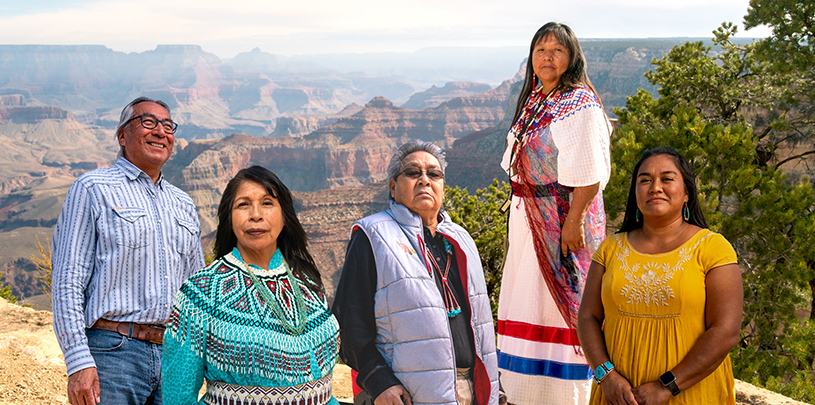
 by Jack Pongyesva, Grand Canyon Manager-Intertribal Centennial Conversations Group
by Jack Pongyesva, Grand Canyon Manager-Intertribal Centennial Conversations Group
People around the world know the Grand Canyon for its ancient rocks, scorching temperatures, steep trails, and thrilling whitewater. But the canyon’s human history isn’t as prominent in the public eye.
A new short film is changing that. “Voices of the Grand Canyon,” directed by Deidra Peaches, a Navajo (Diné) filmmaker, puts Native voices front and center and invites you to deepen your understanding of our country’s most iconic national park.
Come along to experience the Grand Canyon through the stories of Nikki Cooley (Diné), Jim Enote (Zuni), Loretta Jackson-Kelly (Hualapai), Coleen Kaska, (Havasupai), and Leigh Kuwanwisiwma (Hopi) as they share what the canyon means to them and what they know in their hearts to be true.
"Understandably, many people think of the Grand Canyon as a place for recreation...but it is definitely a cultural landscape." — Jim Enote, Zuni
Native peoples have always been a part of the Grand Canyon. Our traditional stories, ceremonies, and songs contain special knowledge that comes from millennia of farming along the river, building dwellings in the cliffs, hunting along the canyon rims, and making pilgrimages to sacred sites.
Today, at least 11 tribes maintain cultural connections to the Grand Canyon — the Havasupai Tribe, Hopi Tribe, Hualapai Tribe, Kaibab Band of Paiute Indians, Las Vegas Band of Paiute Indians, Moapa Band of Paiute Indians, Navajo Nation, Paiute Indian Tribe of Utah, San Juan Southern Paiute Tribe, Pueblo of Zuni, and Yavapai-Apache Nation.
"Once it became a national park, my people were restricted from this area. They were no longer welcomed here." — Coleen Kaska
When Grand Canyon National Park was established more than 100 years ago, Indigenous inhabitants were forced off their ancestral lands to make way for hotels, trains, and tourists. Park gift shops sold Native-made jewelry and pottery, and interpretive panels shared outdated information about Ancestral Puebloans with park visitors, but our histories, our voices, and our cultures were absent from the park for a century.
The film “Voices of the Grand Canyon” grew out of the Intertribal Centennial Conversations Group, a grassroots advisory body that formed around the centennial anniversary of Grand Canyon National Park to usher in a new era of inclusion for Native peoples.
What started as a series of interviews about the group’s vision for the next century grew into a collection of multimedia stories. And a few years later, those stories grew into the 12-minute documentary film, “Voices of the Grand Canyon.”
Now, audiences around the world are hearing voices of the Grand Canyon speak. The film won best documentary at the Indie Film Fest in Phoenix, Arizona in February 2022. It has been accepted into a dozen festivals around the world, including the Flagstaff Mountain Film Festival, American Indian Film Festival (San Francisco, CA), Red Nation Film Festival (Los Angeles, CA), Colorado Environmental Film Festival (Golden, CO), and Quetzalcoatl Indigenous International Film Festival (Quintana Roo, Mexico). You can also catch the film playing at Grand Canyon National Park’s visitor center on the south rim.
"It’s really an honor to be able to go and visit the canyon…I hope that the visitors will come, and also share that kind of feeling. That the Grand Canyon and humanity are all one." — Leigh Kuwanwisiwma
Regardless of the languages we speak, the canyon can give us butterflies in our stomachs, make us feel small, or move us to tears. It stands to teach us all. So please visit with respect, listen, and ask questions. And remember: before the Grand Canyon was a national park, it was the ancestral homeland of Native peoples. And we are still here. The Grand Canyon is still our home.

We'll send you hard copies of the Voices of the Grand Canyon DVD, nine-page print booklet, and discussion questions.